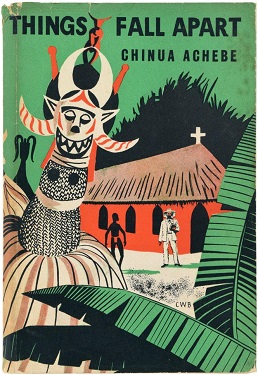Why would Achebe choose to set his novel prior to and during the arrival of the colonial administration as opposed to during the context of production?
European accounts of Africa in the 19 century and before described Africans as non-human, creatures, half-devil, and were dehumanized. Moreover, this has led to stereotypes and notions that Africans were savages and worked chaotically until the colonizers came in and 'saved' them with their laws and system. However, Achebe contrasts and contradicts this by exploring, in part 1, the system of society that the Igbo's following, portraying that they have a law to follow and worked in an orderly fashioned, while not fitting to western standards, it was a system that worked efficiently for its people. Moreover, further down the book, in parts 2 and 3, we can see that the European influence is counter-productive; the European system created disorder in the Igbo system and between its people, as some were shunned out due to converting. I believe all of this is done to reflect the political events occurring during the production of the book. It is only in two years after the publication of the book that Nigeria gained full independence and became its sovereign independent state. Major events that led to independence is of European countries giving back their colonies. So with this push of freedom, the Nigerians will end up facing issues with cultural identity. As noted in the book, Umofia and the neighboring village are somewhat alike, there are also crucial differences, and by extension, the villages beyond Umofia (and the nine villages) are very much different and sharing only a few similarities. However, due to European colonization, all these villages have been labeled all as "one village". Moreover, because of this, all the clans were forced to adapt all as one homologous culture, as perceived by the Europeans. However, now that Nigeria is back to what it is now, the clans now have the freedom to be their "own" clan rather than being labeled to one homologous culture, however, because the European influence had been so severe and so prolonged, this will be challenging for all Nigerians. Especially, now that many of them are devoted Christians and the cultural significance of Igbo is not as strong as it was. Also, with this book, Achebe rekindles the fire of the Igbo culture to the new generation of Nigerians, evident by the massive impact he has on the Nigerian community. Such as impacting people like Chimamanda Ngozi Adichie and paving a road for African literature writers.

Comments
Post a Comment